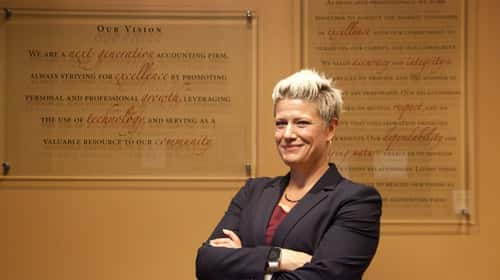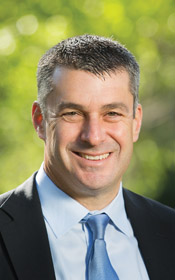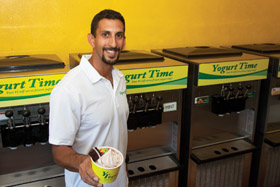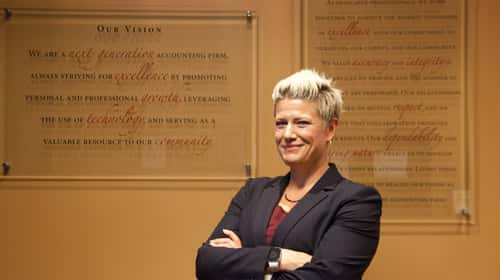
The simple definition of an entrepreneur is a person who organizes and operates a business or businesses, taking on greater than normal financial risk to do so, according to the New Oxford American Dictionary. Dig deeper and you find a passionate person with a high emotional quotient, or EQ, who follows his or her own path to problem-solving to ensure success.

“Entrepreneurs are typically driven by a passion that is founded on core values and beliefs,” says William Silver, dean of the school of business and economics at Sonoma State University. “Then add to that a willingness to take risks. It’s not recklessness but a desire to try something, and then try and try again.”
Entrepreneurism as taught at SSU, says Silver, starts with a specific mindset. “It’s a way of thinking not only about your business but who you are as a person, your work and life. We teach our students that, even if you are not going to be a classic entrepreneur starting your own business, you are always in the business of you, or what we call ‘a venture-of-one.’ I just wrote about this idea in my new book, The Way of Zing: A Guide to Aligning Work and Life.”
Reza Kazemini is a young entrepreneur who understands the venture-of-one concept. When he graduated from Cal Poly University in San Luis Obispo in 2007, he returned to his native Sonoma County determined to find a business pursuit that wouldn’t confine him to a traditional office. Today, he owns and operates five—soon to be six—Yogurt Time stores in Santa Rosa. His office is his car, a mobile environment he prefers to the four walls of an office.
“I studied economics and international management in college,” he says. “When I finished school, I went to work with my parents in their property management company, but I was always looking for a business just for me.”
Soft-served inspiration

At the age of 22, Kazemini had a brainstorm: open a family-friendly store selling self-serve frozen yogurt by weight. His inspiration came from a popular frozen yogurt store in San Luis Obispo that attracted the Cal Poly crowd. He made a trip there, specifically to study the store from a business standpoint. He watched the operation somewhat covertly, compiled a list of possible distributors, and crunched the numbers. He also researched the Sonoma County frozen yogurt market and found scant competition.
“Nobody here had seen the self-serve frozen yogurt retail model, the make-your-own style with lots of toppings. I’m 100 percent certain I was the first person north of San Francisco to introduce it.”
Kazemini used the San Luis Obispo store as a template, then took his idea in a different direction. “That store was geared to college students, but I wanted mine to be kid-friendly, almost like a candy store.”
The young entrepreneur leaned heavily on his parents for advice, and drew from his college studies. “I came up with what I’d been taught, essentially the textbook business proposal with all the numbers. Then my parents gave me the real-life analysis, factoring in worst-case scenarios. Nobody tells you in college that to run your own business you’ll be working 80 hours a week for the first couple of years. Now it’s more like 55 to 60 hours a week.”
He opened his first Yogurt Time store in 2008 in the retail building at the corner of Mark West Springs Road and Old Redwood Highway in Larkfield, next door to Bad Ass Coffee. Other locations in Santa Rosa quickly followed: on Farmer’s Lane (2009), Summerfield Road (2010), and Montecito Boulevard and West Steele Lane (both in 2015). A sixth location is under construction at the corner of Piner and Marlow roads, with completion expected in early 2018. And a seventh location isn’t out of the question, says Kazemini. “If the right property popped up tomorrow, I’d check it out, but for now Santa Rosa is covered as much as it can be.”
Business is good, and he envisions opening stores in Petaluma and Novato within a few years. Franchising the Yogurt Time model, however, is not on his radar. “I don’t see that happening in the future,” he says.
Learning from mistakes
The most successful entrepreneurs I’ve worked with have high IQ and EQ in alignment explains Lannie Medina, founder and board chair of Tech Bay Area Advocates. The Sonoma County-based consultant works closely with entrepreneurs of all types in the tech world and beyond.
“It takes a special set of qualities to be an entrepreneur. For instance, you can’t survive the down times if you don’t have your emotions in check and a positive attitude. You have to stay in ‘computer mode’ and think through a problem or a crisis without letting it affect you. Being successful can really be more about EQ than IQ.”
Successful entrepreneurs have the right intentions and are willing to take risks, adds Medina. “They are passionate and tremendously hard workers. The more effective ones have an ego but also an air of humility, and that’s what creates a safe zone for them to absorb a failure. Entrepreneurs who are really ego-driven and impatient, well, that type of behavior only gets a person so far, and they tend to be the ones who struggle.”
Entrepreneurs possess the drive for continuous learning, too, says Silver. “It’s not just about what they want to do, but having an ongoing curiosity to discover new things and learn from failures and mistakes.”
Kazemini, now 32, is no stranger to failure. He operated a Yogurt Time in Healdsburg for several years before deciding to shutter it in 2013. “There just wasn’t enough year-round population there, so it was only busy a few months out of the year. I learned the hard way that I have to conduct more market analysis before jumping into a new location. From a business perspective, I need a bigger population for drawing enough customers.”
When he opened the first store, in Larkfield, Kazemini encountered a steep learning curve. “And I’m sure a lot of new business owners will agree. You find that you can only screw up so many times before you’re out of business. I know people who opened businesses with a hired manager, rationalizing that they wouldn’t have to work hard to succeed because the manager was the one who would do the hard work. But that’s not realistic.”
Entrepreneurial pathfinders and thinkers always work for themselves, even if they wear the uniform of someone else’s company, according to Silver. “An ethos for Millennials is that their work is not just about earning money, but about making a difference. But it’s not exclusive to Millennials—it’s across generations. People don’t want to spend time at a job, they invest time. They are investing in choices that are deliberate and purposeful. Their time is valuable and they are there to get things done.”
A passion for numbers
Renee Mengali didn’t plan to own her own business by the time she was 25, primarily because she watched how her entrepreneur father worked long hours. “I barely saw my dad growing up, and told myself I’d have to be crazy to want to work that hard. I thought I’d rather work 40 hours a week for someone else and then get a paycheck.”
She didn’t dream of going into accounting, she explains, but does remember having a toy cash register as a child. “I’d create imaginary restaurants and stores so I could use the cash register to ring up the customers. I’ve always had a passion for numbers.”
Mengali was “bored to tears” in high school, she says. “I was a transplant here from Southern California and didn’t have many friends. And I wanted to be done with college as fast as humanly possible.” She graduated from high school at 16 and entered the accounting program at Heald Business College the obtaining her associates degree in accounting at 17. Mengali worked for other employers from the age of 17 to 25 and completed her bachelor’s degree in business from Pacific Union College while launching her own home-based firm, Mengali Accountancy, in 2003.
“Renee is an example of that exceptional combination of high smarts, EQ, drive and bravery that it takes to succeed as an entrepreneur,” says Medina. “She started working for others, as most of us do, and then wanted more. She wanted to create her own firm with a positive and productive culture. Mission accomplished.”
Mengali, 39, says people have preconceived notions of how to go about starting a business, but life is not that predictable. “I knew that business was my calling, just not in what flavor or form. At 16, I wasn’t ready to say I wanted to be an accountant for the rest of my life, yet I knew to become a CEO at General Electric [for example], I would have to acquire the skills that I would need in business, no matter what. And I was drawn to accounting. It turned out to be a passion of mine and a great match for my skill set.”
Savvy networking
As Mengali started her firm she quickly completed her CPA exams so she could increase the services she offered to clients. When she was ready to take the leap from home office to commercial space [on Foss Creek Circle in Healdsburg], she ended up buying instead of leasing. “My father is one of my role models. He always told me that if he had every dollar back that he’d spent on rent during his lifetime, he’d be a rich man.”
Breaking into business in Healdsburg had its challenges. “There were long-time established companies here that already had their CPAs in place. It took some time for the town to get used to my name and get to know me,” she says. Joining the Healdsburg Chamber of Commerce helped her make inroads with the other chamber members and businesses in town.
“When first starting out, you have to understand that you’ll need to sacrifice something today for the hope of tomorrow,” Mengali says. “To be a successful entrepreneur and build a business, you can’t have your cake and eat it, too. Society today tries to tell Millennials, for instance, that they can have it all—dine out every night, take expensive vacations, buy expensive cars. But I fundamentally and wholeheartedly disagree with that.”
She has one important piece of advice for young entrepreneurs starting their own companies: develop a trusted network.
“Talk to other entrepreneurs in your industry. People inherently want to help each other and they will share advice. The most important characteristic you need, is to understand whose advice to take and whose to ignore. This came to me as a Eureka moment. You need a good inner filter to know who is on your side.”
SSU’s Silver says some of the traditional thinking of business schools, in a negative way, is to tell students to network with as many people as possible who can do something for them. “Instead, I encourage students to network in a community where they can do something for others. Then when you need them, they are there for you. That’s kind of a North Bay ethos. I’m not sure you would find that way of thinking in New York City. Mentoring is also important, and we encourage young entrepreneurs to seek out mentors and also be mentors, because sometimes you learn the most when you’re helping out somebody else.”
Spend and save wisely
Spending money wisely is also crucial to success, Mengali says. “Keep your overhead low, even if you’re receiving a huge investment. Don’t squander it. Be conscientious and create a budget you can live with. Estimate how long the cash will last and be prepared for best and worst-case scenarios.”
If you don’t fail occasionally, she adds, you’re not pushing yourself hard enough. “Failure is inevitable and we all make mistakes. But when you make a mistake, take the silver lining that comes with it. Sometimes I look back and ask myself how I did it, because I was so young. But I had foresight, and each year I get smarter.”
There’s never been a day she wanted to give it all up. “I’ve had many discouraging moments, like when we work our tails off for a client and then they nitpick over the invoice. But I’ve never been so discouraged that I wanted to just walk away.”
Mengali has successfully grown her firm to 20 employees. “I was an employee of others before running my own business, and I believe in the Golden Rule, to treat my staff the way I would want to be treated. It brings me great pride to provide good jobs here in Healdsburg, and I deeply value my employees as members of a team who have created this company right alongside me.”
Balancing Life and Work
With the opening of his sixth Yogurt Time store in a few months, Kazemini will have approximately 30 employees. His long-time manager is responsible for inventory and ordering for all the stores, but he still does the payroll, accounting and daily tasks himself. He spends his days traveling between locations, handling phone calls and paperwork in his car.
“For me, customer service and simplicity are my philosophies. That’s what I focused on from the beginning. Whatever your business model is when you first start out, stick to it and don’t forgot it.”
Kazemini has a young family at home, and he balances life and work as best as he can.
Sidebar 1: 8 Traits of Successful Entrepreneurs
strong leadership qualities. A leader values the goal over any unpleasantness the work it takes to get there may bring. But a leader is more than just tenacious. A leader has strong communication skills and the ability to amass a team of people toward a common goal in a way that the entire team works effectively to get there.
highly motivated. Nobody makes progress by sitting back and waiting for it to find them. Entrepreneurs are often passionate about their ideas that drive toward ultimate goals and are notoriously difficult to steer off the course.
strong sense of basic ethics and integrity. Business is sustainable because there is a common, universally understood code of ethics that underpins the very fabric upon which commerce is conducted. Successful business people maintain the highest standards of integrity because, if nobody will do business with you, you are soon out of business.
Willingness to fail. Successful entrepreneurs are risk takers who are not afraid of failure. The old adage “nothing ventured, nothing gained” is correct. Put yourself out there and give it your best shot.
serial innovators. Entrepreneurs are defined by their drive to constantly develop new ideas and improve on existing processes.
Know what you don’t know. Successful entrepreneurs are typically strong personalities overall. They are rarely afraid to ask questions when it means the answers will provide them insight they can then leverage to effect.
Competitive spirit. Entrepreneurs enjoy a challenge and like to win.
understand the value of a strong peer network. In almost every case, entrepreneurs never achieve success alone. The best understand that it takes a network of contacts, business partners, financial partners, peers and resources to succeed.
Source: U.S. Department of Commerce
-
Jean Doppenberg is a lifelong journalist and the author of three guidebooks to Wine Country.
View all posts

 “Entrepreneurs are typically driven by a passion that is founded on core values and beliefs,” says William Silver, dean of the school of business and economics at Sonoma State University. “Then add to that a willingness to take risks. It’s not recklessness but a desire to try something, and then try and try again.”
“Entrepreneurs are typically driven by a passion that is founded on core values and beliefs,” says William Silver, dean of the school of business and economics at Sonoma State University. “Then add to that a willingness to take risks. It’s not recklessness but a desire to try something, and then try and try again.” At the age of 22, Kazemini had a brainstorm: open a family-friendly store selling self-serve frozen yogurt by weight. His inspiration came from a popular frozen yogurt store in San Luis Obispo that attracted the Cal Poly crowd. He made a trip there, specifically to study the store from a business standpoint. He watched the operation somewhat covertly, compiled a list of possible distributors, and crunched the numbers. He also researched the Sonoma County frozen yogurt market and found scant competition.
At the age of 22, Kazemini had a brainstorm: open a family-friendly store selling self-serve frozen yogurt by weight. His inspiration came from a popular frozen yogurt store in San Luis Obispo that attracted the Cal Poly crowd. He made a trip there, specifically to study the store from a business standpoint. He watched the operation somewhat covertly, compiled a list of possible distributors, and crunched the numbers. He also researched the Sonoma County frozen yogurt market and found scant competition. 




